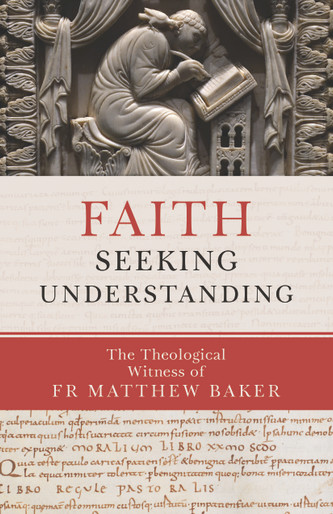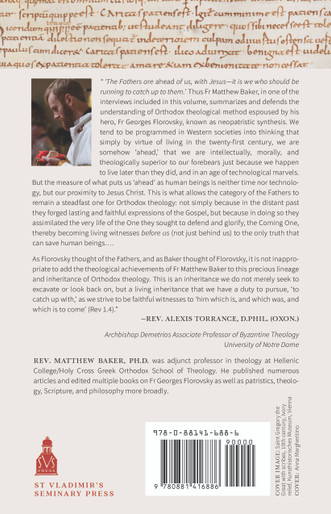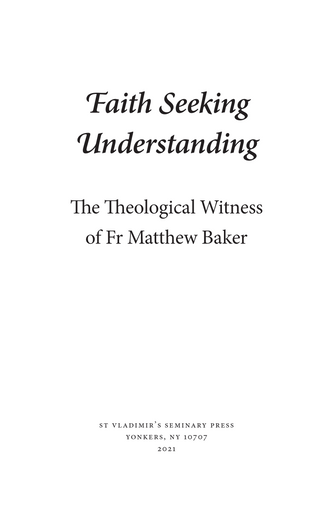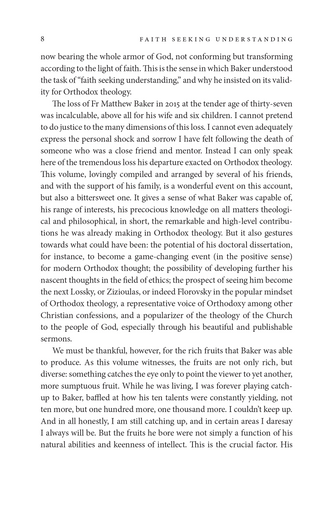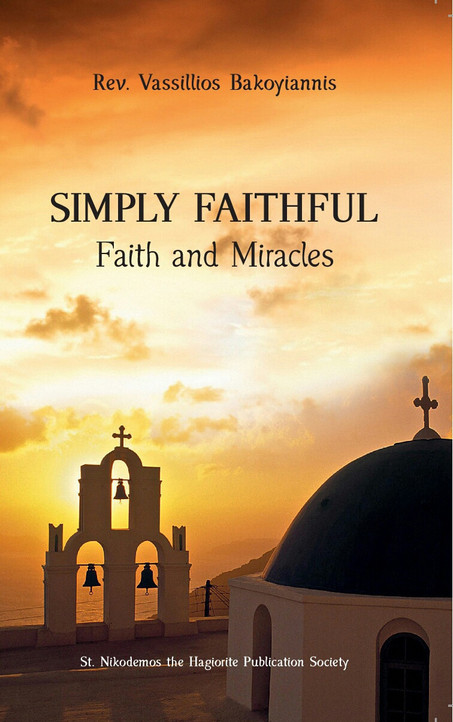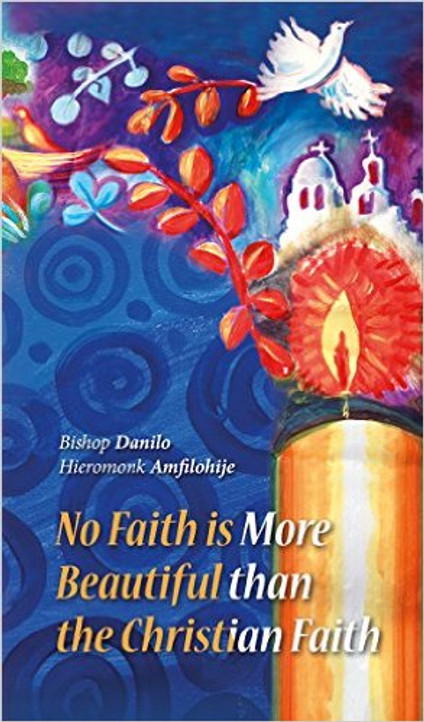Faith Seeking Understanding
Fr Matthew Baker
ISBN: 978-0-88141-688-6, 9780881416886
368 pages
This book offers a collection of the essays, letters, interviews, and correspondence of Fr Matthew Baker, exploring the works of Fr Georges Florovsky and the writings of the Church Fathers.
‘The Fathers are ahead of us, with Jesus—it is we who should be running to catch up to them.’ Thus Fr Matthew Baker, in one of the interviews included in this volume, summarizes and defends the understanding of Orthodox theological method espoused by his hero, Fr Georges Florovsky, known as neopatristic synthesis. We tend to be programmed in Western societies into thinking that simply by virtue of living in the twenty-first century, we are somehow ‘ahead,’ that we are intellectually, morally, and theologically superior to our forebears just because we happen to live later than they did, and in an age of technological marvels. But the measure of what puts us ‘ahead’ as human beings is neither time nor technology, but our proximity to Jesus Christ. This is what allows the category of the Fathers to remain a steadfast one in Orthodox theology: not simply because in the distant past they forged lasting and faithful expressions of the Gospel, but because in doing so they assimilated the very life of the One they sought to defend and glorify, the Coming One, thereby becoming living witnesses before us (not just behind us) to the only truth that can save human beings….
REV. MATTHEW BAKER, PH.D. was an adjunct professor in theology at Hellenic College/Holy Cross Greek Orthodox School of Theology. He published numerous articles and edited multiple books on Fr Georges Florovsky as well as patristics, theology, Scripture, and philosophy more broadly.
4 Reviews
-
Faith Seeking Understanding
Faith Seeking Understanding
The Theological Witness of Father Matthew Baker
Introduction by Alexis Torrance
St. Vladimir’s Seminary Press, 2021, pp. 368, $28.00 ISBN 978-0881416886
“The Fathers are ahead of us, with Jesus―it is we who should be running to catch up to them.” This summary of the thought of the late Reverend Dr. Matthew Baker (1977-2015) is the door into his brief but theologically fruitful life, cut short tragically in a car accident during a snowstorm outside of Boston when he was just 37. Fr. Baker was a married parish priest of the Greek Orthodox Archdiocese of America, and his wife had stayed at home when he took their six children to a vespers service at the church to which he had been recently assigned; the children were miraculously unhurt in the accident that claimed his life. American Orthodoxy responded with an outpouring of mourning and thanksgiving that included a multitude of sermons and tributes; this posthumous volume represents a stage in that collective grief.
Despite dropping out of high school and never completing a college degree, Fr. Baker had been acknowledged in his short life as one of the most important modern Orthodox theologians—the primary inheritor and interpreter of the work of the late Georges Florovsky (1893-1979) whose “neo-patristic synthesis” urged a return to the distinctive “mind” of the Church Fathers as the appropriate source for Orthodox thinking. This new school rejected the “Western Captivity” of Orthodoxy between c. 1600 and 1900, in which Russian and Greek theologians used Roman Catholic and Protestant vocabularies rooted in the European Reformations, and called for a renewed, authentic modern voice for Orthodoxy. The neo-patristic synthesis flourished in the middle decades of the twentieth century, especially within the Russian diaspora in Paris and New York. It notably informed the confident twentieth-century Orthodox engagement with ecumenism—on its own terms, rather than only as an interlocutor with western categories and traditions.
Improbably, the autodidact Fr. Baker read and prayed his way into the riches of this theological school while working the night shift at a gas station for many years. Raised an Episcopalian and attached to S. Stephen’s, Providence as an adult, he became a Roman Catholic in 1997 and gravitated toward Latin Mass communities. After converting to Orthodoxy in 2001, he attended St. Tikhon’s Seminary in Pennsylvania, completed a thesis at Holy Cross Greek Orthodox Seminary in Brookline, Massachusetts, and began doctoral studies at Fordham University (which waived its usual requirement for a B.A.). He was ordained to the priesthood in 2014 and was professor of theology at Holy Cross at the time of his death; Fordham awarded the doctoral degree posthumously.
This important new book gathers Fr. Baker’s scattered writings in several genres between two covers: eight academic essays from theological journals, three book reviews, twelve sermons, two interviews, and ten groups of extended correspondence with colleagues, students, and friends. There are patristic explorations, engagements with Florovsky’s life and writings, truly beautiful sermons on various occasions in the Orthodox Church year, and important interviews that reveal Baker to have been an extraordinary interlocutor with a deep command of vast source material. Non-Orthodox readers will be especially interested in Baker’s correspondence on Florovsky’s attitude toward ecumenism—a contested legacy within Orthodoxy itself. The collection proclaims over and again that “following the Holy Fathers must be a creative and existential endeavor” that “will continue to guide those sensitive to the need to think with the Church of all ages and zealous to advance her historic mission into the present.” Together, the compilation is a testimony to the words of the greatest living Orthodox theologian, Metropolitan John Zizioulas of Pergamon: “Fr. Matthew Baker forced me to answer new questions which I hadn’t thought of before. He somehow entered into the deepest of my intentions. Most others don’t… We had the one, and we lost him.”
Two aspects of the book are curious. First, that in a case in which biography and theology are so intertwined there is no narrative account of Fr. Baker’s life journey. And second, that in an anthology of relatively short works by any given author, there is no résumé of his published writings or indication of the extent of the unpublished manuscripts remaining at the time of his death. Faith Seeking Understanding is nevertheless an extraordinary witness to the capacity of modern American Orthodoxy to raise up minds of deep and synthetic theological creativity.
—The Living Church
-
Remarkable, absolutely remarkable
All I can say is this: wow, and I wish there were more. We see many facets of the brilliant and God-given mind Fr. Matthew Baker had within this anthology. We see the scholar, the theologian, the pastor, the homilist, the friend, and above all, the servant of the Lord Jesus Christ. There is a *lot* of material in this book, and because of such, I would encourage you to read it in a certain order to derive the most benefit from it: I would personally recommend reading the sermons first, the letters second, the interviews third, and the reviews/papers last. I say this simply because not everyone that reads this book will necessarily care to know about current scholarship pertaining to Florovsky, Zizoulas, or Bulgakov, as great as it is. I think doing this will provide a better presentation and a more wholistic comprehension of Fr Matthew’s genius for the average lay person reading this book. While the essays & reviews as well as the interviews are amazing in their own respects (within his essays, my personal favorites were his reflections on Apollinarianism, Athanasius & Sonship, and Ephraim, and would at bare minimum recommend you read these if you skimp out on this part…but don’t do that!), I was particularly drawn both to Fr Matthew’s extremely profound insight & commentary on certain tendencies of thought within modern Orthodox circles, but also to the life and gospel truth that his homilies convey to the reader. It is my hope that future Orthodox writers/thinkers incorporate much of the wisdom found in this book in the future, as I think many needed correctives are here, most especially within Anglophone Orthodoxy.
As a parting gift, here’s a passage from his sermon ‘Priesthood and Sacrifice’:
“All of us here… have weaknesses, profound limitations, of which we may or may not be aware. All of us have encountered crosses in life, some of them very painful; crosses which perhaps we did not choose—crosses which we are probably still learning how to bear with thanksgiving. And further, each of us here—every baptized man, woman, and child— has been called by God. He has called us to be sharers in Christ’s “royal priesthood”: to make the whole of our lives—our work, our rest and play, and all of our relationships—a living sacrifice to God.
This is a high calling, an arduous task. Yet I suggest we can make a start today by beginning, not with our strengths, but with our weaknesses. If we can look realistically at our own deep limitations—the ways in which we so often fail in bearing our own crosses—then perhaps we can begin to approach others with that gentleness which—as one of the Desert Fathers said—comes of remembering that “each and every person we meet is engaged in a deep and bitter struggle.” Then we can begin to see the wounds which we have received in life for what they truly are: a way in which the Lord is preparing us to bring healing to others. We can begin to exercise the priestly virtue of compassion. As in the Holy Eucharist itself, our very brokenness can become the opening through which life may be shared with others. Then our crosses truly become the holy cross. By coming to terms with our own weakness, by showing gentleness towards the weaknesses of others, we can begin to make our whole life a sacrifice: a priestly offering to God, through Jesus Christ our great High Priest. Unto him that loved us, and washed us from our sins in his own blood, and hath made us kings and priests unto God and his Father; to him be glory and dominion forever and ever. Amen. (Rev 1.5-6).”
We need more of Fr Matthew’s stuff published! Memory eternal, Fr Matthew!
Lawson Bowick -
Vivifying and Excellent Collection
Those who knew Fr. Matthew of blessed memory should know how deeply he has impacted so many of us who have become more familiar with him only in recent years. This was precisely what I was looking for in terms of a collection of his writings and thought, from pastoral to theological. Reading this book, one can truly understand what a unique thinker he was, and it seems a true blessing to know that his legacy will live on through this witness.
-
A Theological Achievement!
As Florovsky thought of the Fathers, and as Baker thought of Florovsky, it is not inappropriate to add the theological achievements of Fr Matthew Baker to this precious lineage and inheritance of Orthodox theology. This is an inheritance we do not merely seek to excavate or look back on, but a living inheritance that we have a duty to pursue, ‘to catch up with,’ as we strive to be faithful witnesses to ‘him which is, and which was, and which is to come’ (Rev 1.4).

